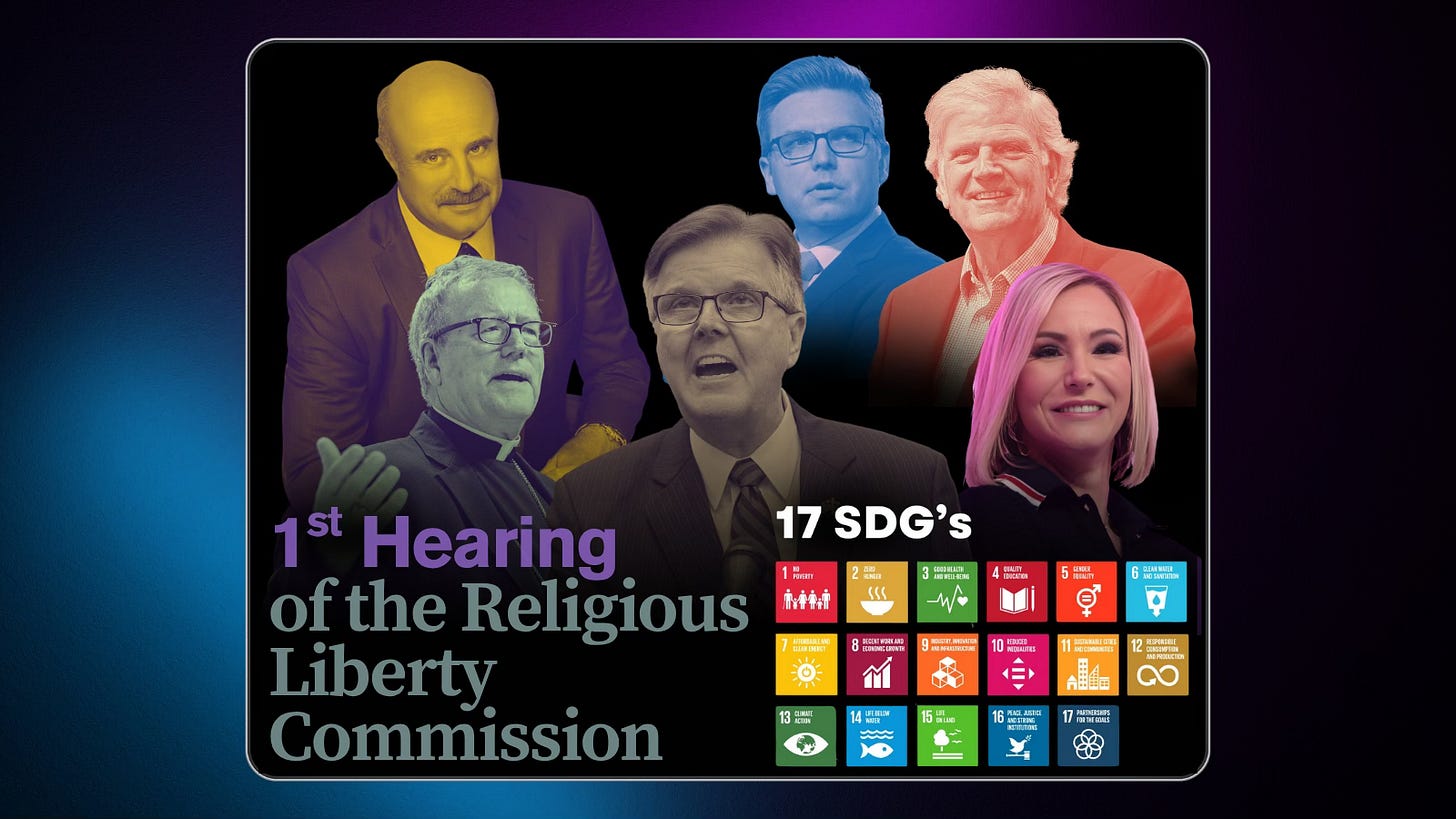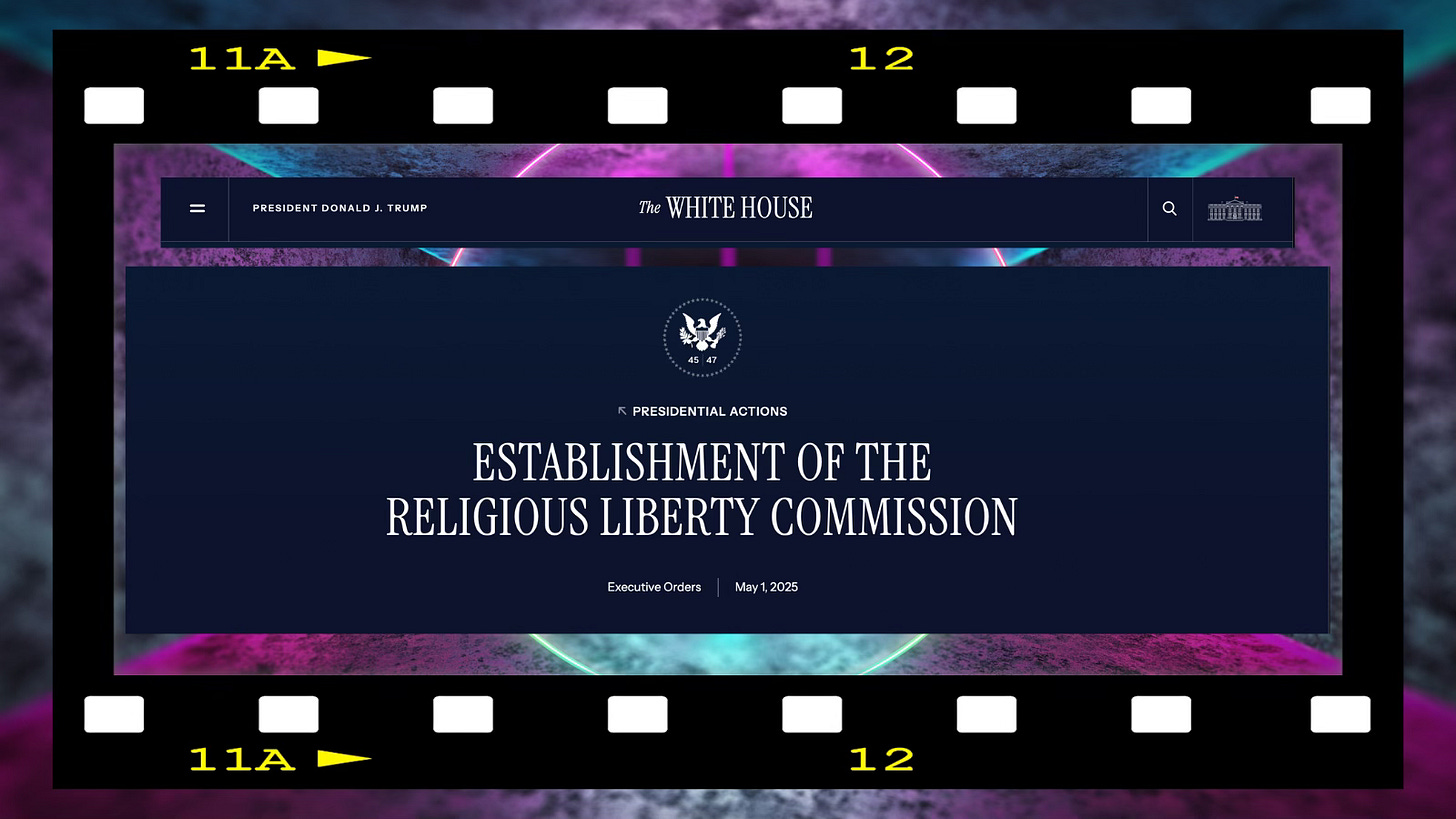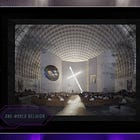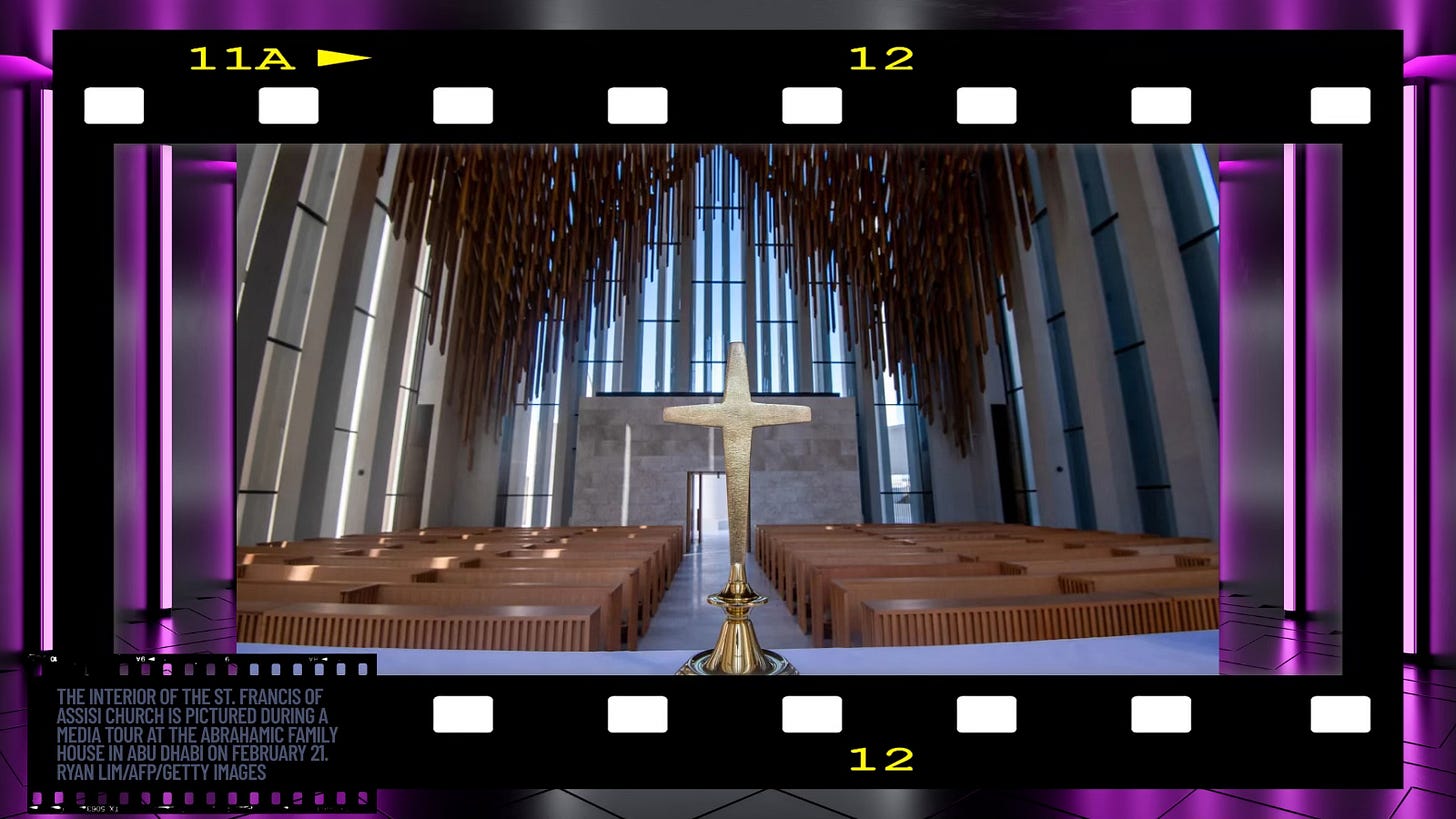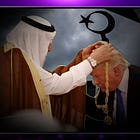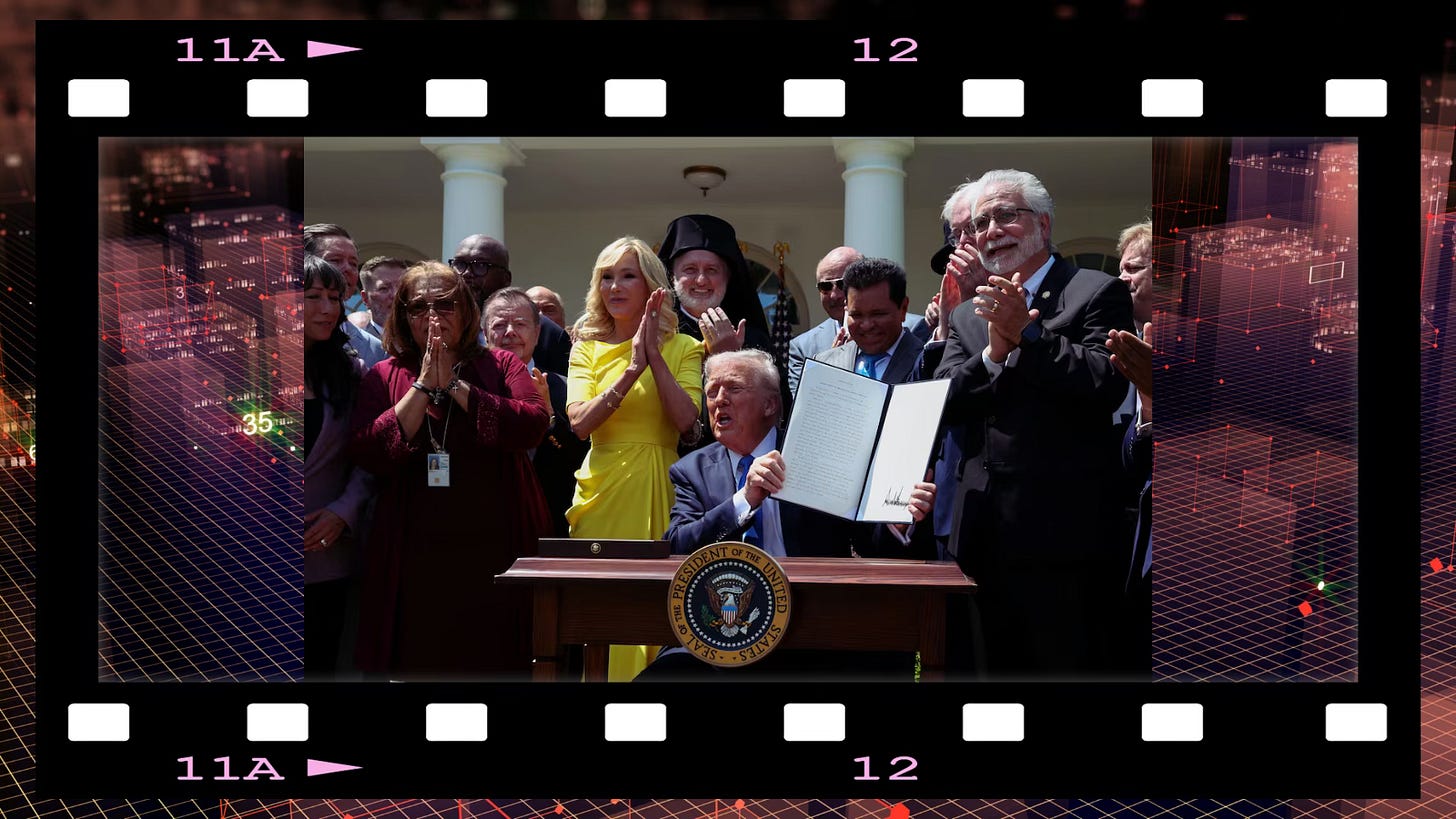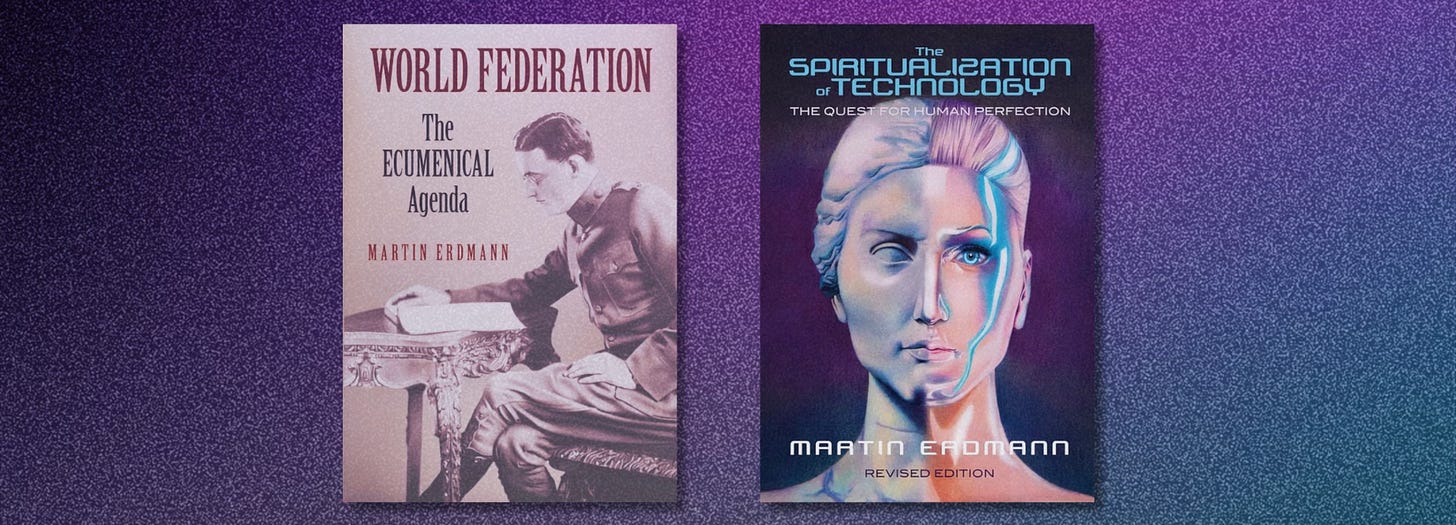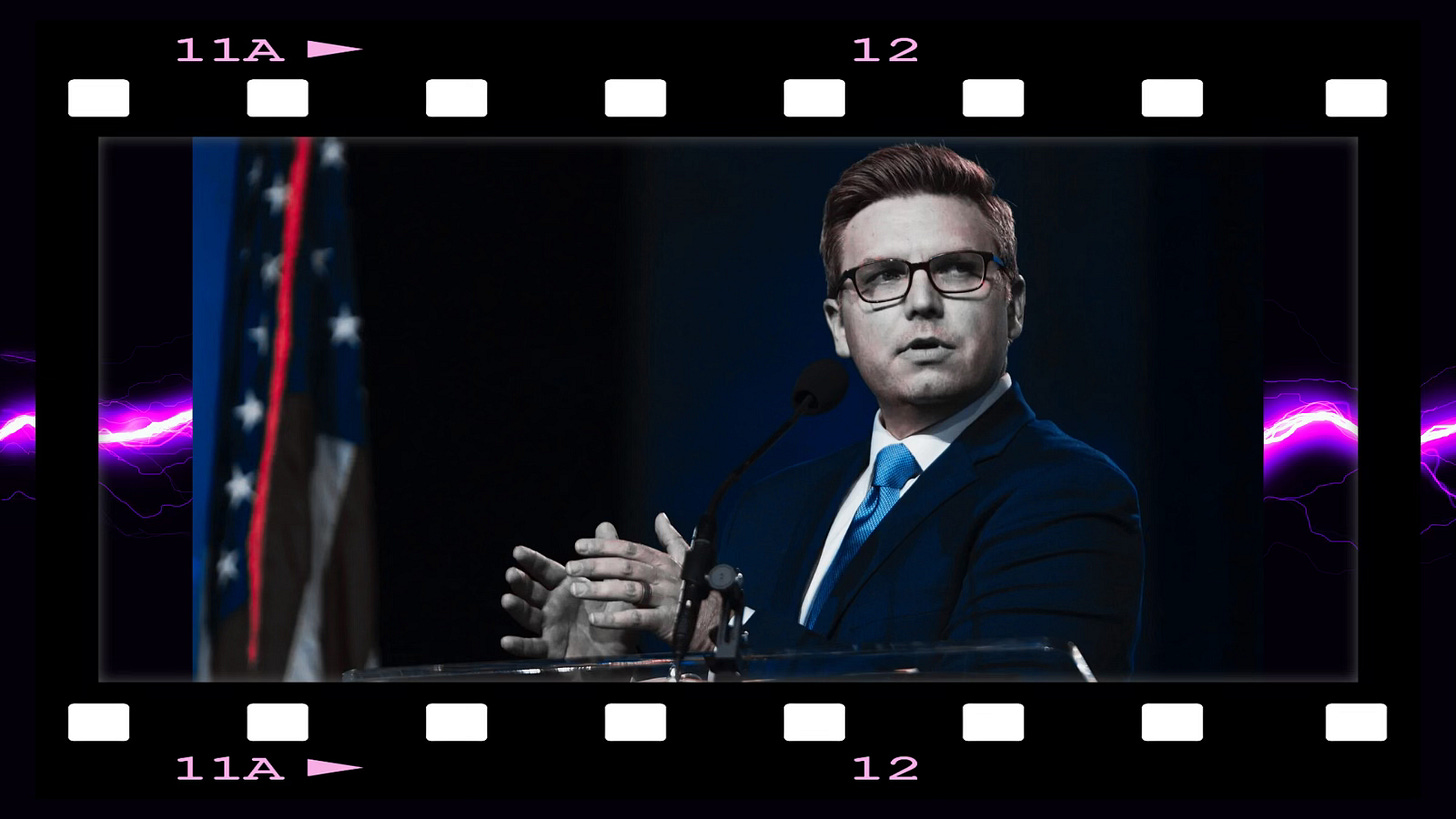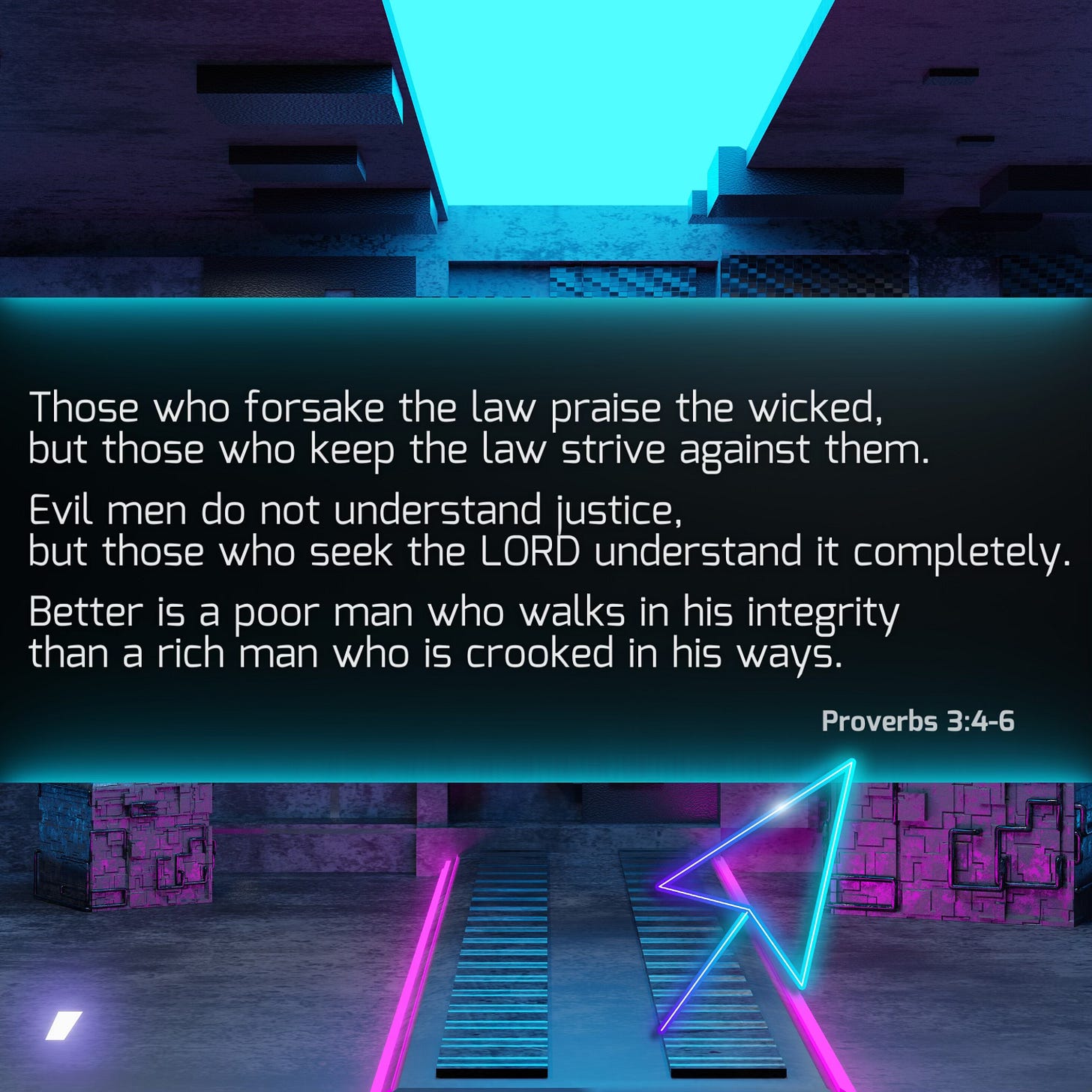Heads up, saints: The Religious Liberty Commission is what happens when multicultural policy and the UN’s Sustainable Development Goals begins to redefine religious freedom.
KEY TAKEAWAYS
The First Amendment secures THAT one is at liberty to believe. Trump’s New Religious Liberty Commission seeks to standardize WHAT one is at liberty to believe.
Please don’t scroll past this. You need to know the truth about what’s happening.
On the surface, Trump’s 2025 Religious Liberty Commission appears to be a win for the people of faith. However, beneath the conscientious-sounding platitudes lies an alarming dictate. A form of managed pluralism—doctrinal gatekeeping wrapped in patriotic language—where the very meaning of religious freedom is being redefined as those beliefs that conform to state-approved standards of tolerance and inclusivity.
In a world hostile to the absolute truth claims of Christianity, The First Amendment has been a bulwark for the church and a guardian for the Great Commission. And even though her sins were many, for over two-hundred years, God produced a multitude of American missionaries who carried the light of the gospel to the farthest flung territories of the world.
When liberty is redefined as the equal validity of all beliefs, the exclusive truth of the gospel must necessarily be recast as intolerance. True Christianity does not require state permission, it requires freedom from state control to proclaim Christ as Lord, not merely as one option among many. Any attempt to position Christ alongside other “valid paths” is a denial of His own declaration. To dilute His own claim in the name of religious unity is not love—it is betrayal.
Undermining The First Amendment
The First Amendment to the U.S. Constitution is, in itself, sufficient to protect religious liberty. It does not require enhancement, reinterpretation, or institutional reinforcement through commissions, councils, or federal advisory boards. Its strength lies in its restraint:
“Congress shall make no law respecting an establishment of religion, or prohibiting the free exercise thereof…”
This establishes two simple yet profound principles:
Non-establishment: Government cannot create or endorse a national religion.
Free exercise: Individuals may worship—or not worship—as conscience dictates.
The Founders’ wisdom was not in attempting to define what constitutes “correct” belief, but in restraining the government from doing so. This principle creates space for the gospel to be preached, false religions to be tested and exposed, and for consciences to be bound by truth rather than force.
Christ Criminalized
When a government-affiliated body like the Religious Liberty Commission convenes an “inclusive” panel of religious leaders from across the spectrum of faith traditions (interfaith ecumenism) for the stated purpose of protecting religious liberty, we should expect and be on high alert for its inevitable drift from safeguarding liberty to managing doctrine.
What to Watch For:
Defining that which represents legitimate religious expression
Setting policy boundaries around what constitutes acceptable belief or practice
Equating incompatible truth claims under the banner of “shared values”
In short, the nature of this Commission, created by executive fiat, without a debate, vote, or clear public demand for it, requires that we vigilantly watch for statements and policy proposals that represent a drift of the federal government from protector of religious freedom to arbiter of conscience and valid religious content—which is exactly what the First Amendment exists to prohibit.
For Example:
While the Founders could not know the exact players that would be involved two-hundred years down the road, they were impressively prescient in their anticipation of such a scenario where either ignorant or insidious actors might, for example, assemble Baptist pastors, Catholic bishops, Quaker elders, and Muslim imams to “protect religious liberty.” Then, in the interest of “unity,” such a body might urge Baptists to stop preaching sola fide (salvation by faith alone, in Christ) because it offends the other faith traditions. Familiar with such malignant top-down doctrinal regulation, their preventative prescription was The First Amendment:
“Congress shall make no law respecting an establishment of religion, or prohibiting the free exercise thereof…”
(U.S. Const. amend. I)
This succinctly affirms that the civil magistrate has no rightful authority to impose religious doctrines or restrain the liberty of conscience in worship and belief—an idea deeply rooted in the Christian conviction that only God is Lord of the conscience (cf. James Madison, Memorial and Remonstrance Against Religious Assessments, 1785).
Fast forward to today:
It seems that the wisdom of the Founders has either been forgotten or that ignorant or insidious actors in the Executive Branch have aspired to improve upon an already sufficient prescription that has kept the nation free from zealots for over two-hundred years.
Consider this scenario that the existence of such a Commission makes possible:
“Jesus said to him, ‘I am the way, and the truth, and the life. No one comes to the Father except through me.’” (John 14:6 ESV)
This is an exclusive truth claim. This single verse sets the gospel of Jesus Christ apart from all other faiths and religious systems. That Jesus Christ is the only way to be saved, the only way to God the Father and not one way among many is both a fundamental core doctrine of Christianity and one of the clearest and most exclusive truth claims in all of Scripture.
But, under the watchful ecumenical eye of managed pluralism, like the Religious Liberty Commission, this statement must necessarily be deemed intolerant.
If a citizen or member of the Commission is offended by Christ’s exclusivity, then Christ, Himself, must be cited as hateful and His words prohibited. This is how the Religious Liberty Commission could very easily cut the heart out of Christian faith in America.
The Jefferson Bible: A Cautionary Deist Tale
Thomas Jefferson believed that Jesus was a great moral teacher whose true message had been corrupted by what he called “priestcraft” and superstition. (This will inevitably end up being the conclusion of any ecumenical government body charged with “protecting religious liberty.”) In 1820, Jefferson literally took a razor and scissors to several copies of the New Testament in Greek, Latin, French, and English to extract what he considered to be the pure ethical teachings of Jesus from the text of Scripture, removing all references to miracles, the supernatural, the virgin birth, resurrection, or Jesus’ own claims of deity.
This is another clear example why even the greatest political philosophers and framers of government must never be allowed to arbitrate the truth claims of religion.
The primary mind behind the Declaration of Independence—who gave us the term tyranny thwarting term “Nature’s God” as an objective, transcendent, unchanging source in which human rights are necessarily grounded—surgically excised the One in which those rights originate from his Bible version, pasting only those verses and passages that he deemed authentic moral instruction into a new chronological narrative to highlight Jesus’ ethical philosophy free from any miraculous elements.
The result was a text emphasizing Jesus as a moral sage, not the incarnate Son of God (See Thomas Jefferson, The Jefferson Bible: The Life and Morals of Jesus of Nazareth, c. 1820).
Not unlike Thomas Jefferson’s re-rendering of the Bible to suit his Enlightenment rationalism and Deistic leanings, under political or cultural pressure, the Commission could in similar fashion, functionally “redact” the gospel. By using the force of law instead of a razor and scissors, it is within reason to expect that such an ecumenical and inclusive government body would eventually attempt to authorize a version of the Bible more palatable to pluralistic society, effectively outlawing the very truths that make Christianity distinct.
Intentional or not, the Religious Liberty Commission’s edicts are inherently self-defeating, much in the same way that the Progressive doctrine of multiculturalism always results in the erasure of the dominant culture. Like a parasite that kills its host in the name of inclusion and tolerance, severing its moral and spiritual roots. In a nearly identical way, the new Commission’s managed pluralism, where absolute truth claims are inevitably condemned, will necessarily result in the erasure of America’s biblically Christian roots.
In light of the White House’s Office of Faith and the newly established Religious Liberty Commission, it is clear that the federal government has overstepped its God-ordained bounds. Nowhere in Scripture does God authorize the State to regulate, curate, or convene religious belief. This arrangement is not just unbiblical, it’s a direct inversion of the church’s distinct and separate role. Matthew 22:21, Acts 5:29, Romans 13
“The persecution of the church would lay the foundation for one of the core principles of Christian political theology: the church is a distinct institution from the State. Unlike other cultures of the ancient world, including Old Testament Israel, religion and government in Christianity are separate institutions with different spheres of authority and with distinct responsibilities. Both are ordained by God for his purposes in the world and in the best case can cooperate and work together toward the common goal of producing a just and peaceful society, but this is neither necessary nor inevitable. The church can perform its work even in the face of murderous hostility from the government, and thus the two cannot properly ever be united into a single entity. Until Christ returns, theocracy is off the table.”
—Glenn S. Sunshine, Slaying Leviathan: Limited Government and Resistance in the Christian Tradition
Below: (1) the full text of the May 1, 2025 Executive Order establishing the Religious Liberty Commission; (2) CBN News coverage detailing its launch and participant roster; and (3) the official transcript of the Commission’s first public hearing, which offers a revealing look into its guiding philosophy and how it aims to steer American religious policy toward global governance frameworks.
Item 1 - 2025 EO Establishment of the Religious Liberty Commission
https://www.whitehouse.gov/presidential-actions/2025/05/establishment-of-the-religious-liberty-commission/
Item 2 - CBN News Report Clip (26 seconds)
Item 3 - First Hearing of the Religious Liberty Commission Video Part 1
Seen & Heard
Religious Liberty Commission
The May 1, 2025 Executive Order signed by Donald Trump establishing the Religious Liberty Commission appeared, on the surface, to be a win for Christians in America. But a deeper examination reveals that the Commission serves as a carefully engineered instrument for integrating global governance goals into American civil and religious life under the guise of protecting faith.
To say it plainly: the new Religious Liberty Commission does not defend religious freedom, it dismantles it. It is proof that the tentacles of multicultural ideology have seized the public square, choking out biblical Christianity under the guise of tolerance and diversity.
Multiculturalism is never neutral. It is inherently hostile to the ethnic nation in which it is implemented. Across the Anglosphere1, it has been strategically deployed to subvert Christian foundations, eroding national identity, undermining moral order, and silencing gospel truth.
The Religious Liberty Commission is promoted as an advisory committee to the White House Office of Faith. In practice, the Commission appears designed to subtly shift the boundaries of what is socially and politically acceptable to believe, reinforcing those limits through federal influence. By assembling a curated mix of religious figures, it creates the appearance of broad representation, when in reality, the parameters of permissible belief were established long before the Commission ever convened.
This system aligns perfectly with the United Nations’ Sustainable Development Goals. The incoming legal apparatus guided by AI, social compliance systems, and reflexive law operates under the banner of “liberating tolerance2,” a euphemism for the systematic suppression of anything traditionally Christian, white, heterosexual, or grounded in moral absolutes.
In short, the Religious Liberty Commission is the end of religious liberty.
The theological lineage of the Puritans, America’s founding ethno-religious group and the architects of its moral framework, have been deliberately excluded from the Commission. Their voice is unwelcome because their theology insists on sin, repentance, and the lordship of Jesus Christ. And that is precisely what this new system is designed to eliminate.
Multiculturalism is not the benign celebration of diversity it pretends to be. As Richardson and Salter3 explain,
“Multicultural policies are often aggressive towards the founding ethnic group, acting like a form of cultural warfare intended to defeat Anglos demographically, economically, and psychologically.”
In this war, the target is not just ethnicity, it is belief, heritage, and the entire moral order that once defined the Anglosphere.
From its inception, multiculturalism has excluded Anglo advocates and systematically undermined their moral and cultural authority. The authors note:
“From its beginnings in the 1970s, Anglo advocates were excluded from multicultural forums and remained the prime targets of multicultural attacks on freedom of speech and association.”
What was once called religious liberty has been reframed as a threat, something to be constrained, censored, or replaced.
Nowhere is this inversion clearer than in the Religious Liberty Commission itself.
This federally-affiliated body exists to ultimately advise the White House Office of Faith on how to institutionalize an “approved,” “open and affirming,” interfaith version of Christianity, one that conforms to the doctrines of global pluralism and ideological compliance. Again, in practice, the Commission is designed to define what Americans are permitted to believe and to enforce those limits through state mechanisms.
This is not religious liberty. It is ideological conformity masquerading as freedom.
Most people will not recognize this deception for what it is. But for those following along with us, the reality is staggering: this Commission is the most direct and dangerous attack on God we have yet witnessed in American public life, and what’s particularly frightening is that it’s being done in the name God!
The Commission projects itself as a guardian of faith, but in reality, it promotes a false peace built on religious pluralism, not biblical truth. Many well-meaning Christians are being deceived—told that unity and tolerance are greater than truth and repentance.
“Do not be deceived: God is not mocked, for whatever one sows, that will he also reap.” (Galatians 6:7:ESV)
This is a direct affront to the holiness and exclusivity of God’s revelation in Christ. This Commission, under the guise of protecting religious liberty, has invoked the name of God to advance a Progressivist agenda of ecumenical and political unity reducing Christ—the one true and living God (John 14:6; Acts 4:12)—to a co-equal among many false gods and ideologies. Judaism, Islam, Sikhism, and any other group who may claim religious equality under the Commission’s rubric—including, logically, Satanism and Theosophy.
This is not harmless interfaith dialogue—it is blasphemous parody, dressing idolatry in the language of liberty.
This Commission is sowing a seedbed of spiritual confusion and compromise. What will it reap? Judgment. The fruit will be apostasy, not revival; and slavery to government overreach rather than the “freedom” they ostensibly seek to codify.
“I am the Lord; that is my name; my glory I give to no other…(Isaiah 42:8)
It is, without exaggeration, the boldest assault on Jesus Christ in modern history, because it subversively seeks to outlaw sin, silence the call to repentance, and eliminate both the need for and the true knowledge of the Savior.
The Religious Liberty Commission’s first hearing, held shortly after the National Day of Prayer, featured a lineup of scholars and advocates. Yet the event’s rhetoric, while seemingly faithful to the Constitution and biblical principles, concealed a more dangerous fusion: the harmonizing of revisionist4 religious liberty with the United Nations Sustainable Development Goals (SDGs), therapeutic governance, and the infrastructure of the global technocratic order.
This is not conjecture. It is the very pattern Dr. Martin Erdmann5 warned about in The Triumph of Progressivism: The Historic Pursuit of a World Federation—a system in which religious liberty is repurposed to serve the progressivist vision of universal civil religion and global unity.
“The founders never used the term secular when they talked about religion and the polity… proper government care for the temporal common good included encouragement and help and recognition of religion.” – Professor Gerard V. Bradley, First Hearing
This quote highlights a key tension. When “proper government care” includes “recognition of religion,” but religion is redefined through secular and interfaith frameworks, the state does not merely tolerate religious conviction, it conditions and engineers it.
Who Was in the Room? 🚨 Participants of Concern
Here’s a breakdown of some of those present and associated with the first hearing of the Religious Liberty Commission who raise serious red flags based on their past statements, affiliations, or ideological patterns:
🔸 Paula White-Cain
False teacher and prosperity gospel proponent; closely tied to the New Apostolic Reformation (NAR) movement.
Instrumental in the creation of Trump’s Faith Office in 2017.
Openly supports interfaith partnerships and Dominionist theology—views incompatible with biblical Christianity.
Promotes a therapeutic, experiential gospel that serves globalist religion-by-consensus.
❗ Paula White is a prime example of the charismatic ecumenism used to neutralize doctrine in favor of emotional unity.
🔸 Bishop Robert Barron
Prominent Catholic bishop and media figure who promotes Catholic universalism—the idea that sincere people of all faiths may be saved.
Supports interfaith dialogue and Vatican-aligned ecumenism, including the Human Fraternity document signed by Pope Francis and Muslim leaders.
A consistent voice in aligning Christianity with global “peace” and social justice frameworks.
❗ Barron represents Rome’s long-standing effort to consolidate religious authority under the guise of peaceful pluralism.
🔸 Dr. Phil McGraw
Not a theologian or religious leader—his presence indicates the therapeutic turn in religious liberty, where mental health and flourishing minds replace doctrinal conviction.
Advocates for school-based psychological programs, which often overlap with SEL (Social Emotional Learning) and SDG-aligned behavioral frameworks.
❗ Dr. Phil’s inclusion signals that religious liberty is being medicalized, framed as emotional well-being instead of doctrinal freedom.
🔸 Brent Leatherwood (ERLC)
Leads the Southern Baptist Convention’s ERLC, which has shown increasing openness to interfaith political coalitions and woke-adjacent rhetoric under the guise of justice.
The ERLC has been criticized for downplaying biblical exclusivity and prioritizing public policy optics over clear gospel witness.
❗ The ERLC's role under Leatherwood reflects SBC compromise on worldview clarity in exchange for policy influence.
🔸 Rabbi Ari Lamm
As a Jewish religious leader, his inclusion reinforces the interfaith structure of the commission—i.e., that “religious liberty” is not about Christian faith, but civil religion.
While respectful interfaith dialogue is possible, shared governance of religious principles across contradictory worldviews is not biblically defensible.
❗ Interfaith representation shifts the framework from truth to consensus—undermining the gospel claim that Jesus is the only way.
While some participants like Dr. Carol Swain, Kristen Waggoner, or Michael Farris may genuinely care about First Amendment protections, the inclusion of high-level interfaith voices (Barron, Lamm), charismatic prosperity figures (White), and therapeutic celebrities (Dr. Phil) indicates that the Commission is designed not to defend the faith, but to moderate it into acceptability.
What’s most glaring is the absence of anyone who represents the founding religious perspective of the United States, namely, those grounded in solid biblical, Protestant Christianity. These figures are not guardians of the faith once delivered to the saints. They are gatekeepers of a pluralistic, managed religion, one carefully curated to align with the Sustainable Development Goals.
This is what a Religious Liberty Commission looks like under the control of multicultural frameworks, structures not built to protect faith, but to subvert the founding nation’s principles and people, ultimately shaping a population of compliant global citizens.
Reflexive Law and Lawfare: The Legal Arsenal of Technocracy
👁🗨 You’re Not Being Governed. You’re Being Managed.
Trump’s National Day of Prayer and the Faith Office
This Religious Liberty Commission cannot be divorced from the broader rollout seen during the 2025 National Day of Prayer and Office of Faith, where Trump declared:
“We’re bringing religion back to our country, and we’re bringing it back quickly and strongly.”
Programs emphasized “brain health,” “flourishing minds,” and “protecting women and children” all language directly traceable to UN and WEF frameworks.
In Erdmann’s analysis, this merging of spiritual language with bureaucratic control is not accidental, it’s foundational to the globalist vision of a managed world system:
“World federation cannot allow any doctrine of absolute truth to remain unchallenged; it must synthesize all beliefs into a unified ethical framework governed by ‘rational’ principles.” ²
Leatherwood’s Skrmetti Win and Strategic Optics
On June 18, 2025, Brent Leatherwood and the ERLC publicly celebrated the Supreme Court’s 6–3 ruling in United States v. Skrmetti, upholding Tennessee’s ban on so-called gender transition procedures for minors. The ERLC originated a legal brief defending the state’s action on biblical grounds, affirming the biological definition of sex and protecting children from irreversible harm.
In many ways, this ruling is praiseworthy. It protects vulnerable children from ideological and surgical assault. However, this win must be viewed with careful discernment.
The same ERLC that rightly opposes transgender surgeries has also, under Leatherwood’s leadership, participated in interfaith initiatives, embraced winsome language on LGBTQ+ engagement, and emphasized therapeutic optics over theological clarity. As earlier noted:
❗ “The ERLC's role under Leatherwood reflects SBC compromise on worldview clarity in exchange for policy influence.”
We must ask
Is this ruling being positioned as proof of the Commission’s spiritual integrity, even while its theological framework quietly accommodates civil religion and technocratic consensus?
A just law does not automatically sanctify the institutions promoting it. As Christians, we praise God when evil is restrained, but we remain alert when political platforms use moral wins to camouflage deeper compromise.
In short: Yes, we affirm the outcome. No, we do not blindly affirm the institutions seeking credit for it. Scripture reminds us that
“even Satan disguises himself as an angel of light” (2 Cor. 11:14),
and that every institution must be tested not only by what it defends, but by what it permits, excuses, and ultimately serves.
This development reveals the strategic complexity of our current moment.
We must celebrate just rulings without sanctifying the institutional systems that deliver them. A godly outcome does not validate the bureaucratic apparatus beneath it. The gospel demands both discernment and courage, praise for what is true, and protest against what manipulates the truth for political gain.
The Commission’s Real Legacy
From its earliest days, Christianity has had a complex relationship with the state. Jesus was clear that His kingdom is not of this world (John 18:36) and, therefore, that His work was not about political power. He also taught that we are to give to Caesar (i.e., the government) the things that are Caesar's, which means that Caesar really does have legitimate claims on us (Matt. 22:21; Mark 12:17; Luke 20:25). At the same time, however, that claim is not all-en-compassing: we are to give to God, not to Caesar, the things that belong to God. The government may not take on authority that properly belongs to God or, by extension, to the church. — Glenn S. Sunshine, Slaying Leviathan: Limited Government and Resistance in the Christian Tradition pg 7
The Religious Liberty Commission does not defend Christian conscience, it seeks to define what you’re at liberty to believe.
All in service of a post-Christian order.
Its hearings blend civil religion, interfaith diplomacy, and soft technocracy. Its goals are wrapped in the language of virtue and freedom, but its direction is unmistakably progressive, managerial, and global.
Biblical Christianity cannot be “revivified”6 by bureaucratic means. It must be preached, lived, and defended as the unchanging truth of a sovereign God not curated by commissions or adjusted to accommodate pluralist peace.
Let us remember: the truth needs no defense team, only a faithful witness. Christ’s Kingdom is not in jeopardy, even when earthly ones fall.
Keep holding the line.
“We must obey God rather than men.” Acts 5:29
Stand firm in Christ. He is faithful.
Soli Deo Gloria!
Martin Erdmann, The Triumph of Progressivism: The Historic Pursuit of a World Federation (Verax Institute, 2024), 122.
Ibid., 188.
Harry Richardson and Frank Salter, Anglophobia: The Unrecognised Hatred (Melbourne: Independent Publishing Network, 2021), 9–10.
Martin Erdmann, The Triumph of Progressivism: The Historic Pursuit of a World Federation (Verax Institute, 2024), 341–46.
United Nations, Transforming Our World: The 2030 Agenda for Sustainable Development, A/RES/70/1 (2015). See also analysis of ESG and DEI frameworks as mechanisms for ideological enforcement in corporate and governmental policy.
Donald J. Trump, remarks at the National Day of Prayer, May 2, 2025.
Paula White-Cain, sermons and public statements, including leadership of the White House Faith and Opportunity Initiative, 2017–2021.
Augustine, The City of God, trans. Marcus Dods (New York: Modern Library, 1950), Book XIX.
Roger Williams, The Bloudy Tenent of Persecution for Cause of Conscience (London: Richard Cotes, 1644).
D. A. Carson, The Gagging of God: Christianity Confronts Pluralism (Grand Rapids: Zondervan, 1996).
Francis Schaeffer, A Christian Manifesto (Wheaton, IL: Crossway, 1981).
Carl R. Trueman, The Rise and Triumph of the Modern Self (Wheaton, IL: Crossway, 2020).
About Armor of Truth: https://armoroftruth.substack.com/about
Download the Armor of Truth Mobile App Free
NEW! AoT Locals
NEW! AoT Telegram
Join our AoT Newsletter email list
Armor of Truth, Inc is a 501(c)(3) Non Profit Organization
Donations are tax deductible
By supporting Armor of Truth you are helping to reach thousands of people daily with the Gospel of Jesus Christ and encouragement to persevere in a world that is hostile to the gospel. Please consider making a donation to help support this mission.
Support Armor of Truth Donate
Trump Executive Order • Religious Liberty Commission • Interfaith Agenda • SDG Religion • Faith Office • Global Pluralism • Stakeholder Faith • Technocratic Christianity • Paula White • Franklin Graham • religious liberty commission · Donald Trump faith office · sustainable development goals · pluralism and Christianity · SDG religion · therapeutic governance · National Day of Prayer 2025 · Paula White Trump · Robert Barron ecumenism · soft law religion · reflexive law technocracy · interfaith deception · Dominion theology critique · religious liberty technocracy · Martin Erdmann progressivism · prosperity gospel false teaching · civil religion America · Trump charismatic politics · SEL and religion · global governance and faith · managed pluralism Christianity
The Anglosphere refers to English-speaking nations with shared British heritage, common law systems, and cultural roots in Anglo-Protestantism—primarily the U.S., U.K., Canada, Australia, and New Zealand. It is the primary target of multicultural policies aimed at dismantling Christian moral and cultural foundations.
“Liberating tolerance” is a Marxist concept coined by Herbert Marcuse, meaning tolerance only for leftist ideas and suppression of opposing views. It redefines tolerance as a tool for ideological control by labeling traditional, Christian, or conservative beliefs as repressive.
Harry Richardson and Frank Salter argue in Anglophobia: The Unrecognised Hatred that multiculturalism in the Anglosphere functions as cultural warfare—targeting not just ethnicity, but belief, heritage, and the entire moral order that once defined Anglo-Protestant civilization. The Anglo majority is systematically excluded from public discourse, legal protections, and cultural legitimacy.
Revisionist history refers to the reinterpretation of historical facts, often to serve political or ideological agendas. It frequently involves distorting or omitting truth to undermine traditional narratives, particularly those rooted in Christian, Western, or national foundations.
¹ Martin Erdmann, The Triumph of Progressivism: The Historic Pursuit of a World Federation (Verax Institute, 2024), 122.
² Ibid., 188.
Dr. Martin Erdmann is a theologian and historian of modern church-state relations. He holds degrees from Columbia International University, the University of Basel, and the University of Aberdeen, with a Habilitation in Systematic Theology from Károli Gáspár University. Erdmann directs the Verax Institute and is author of multiple works exposing the spiritual foundations of global governance.
Biblical Christianity cannot be “revivified” through bureaucratic or state-managed efforts because true revival is a sovereign work of God through the preaching of the Word, the conviction of sin, and the regenerating power of the Holy Spirit, not through commissions, policies, or institutional frameworks.





